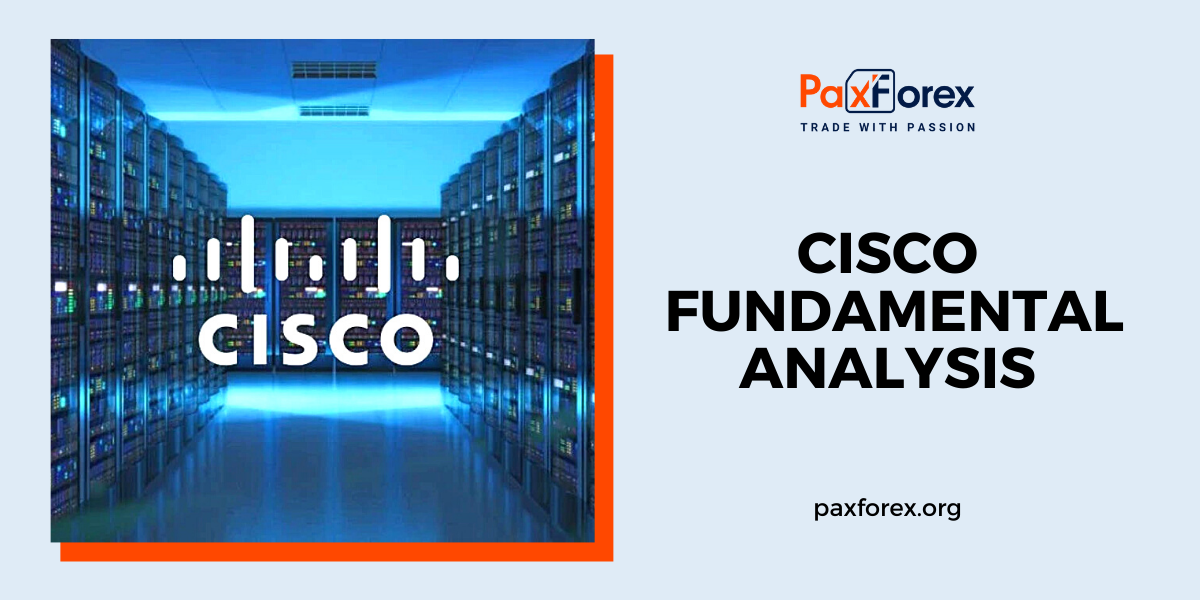
Source: PaxForex Premium Analytics Portal, Fundamental Insight
Over the past few years, the technology sector has experienced a relative calm in terms of high-profile mergers and acquisitions. However, in recent months, notable players like Microsoft, Alphabet, and Amazon have injected significant capital into artificial intelligence startups such as OpenAI and Anthropic, drawing substantial attention.
While these transactions have been widely publicized, they constitute only a fraction of the substantial appetite of major tech companies. A recent development comes from Cisco Systems, which has unveiled its plan to acquire the cybersecurity firm Splunk for a substantial $28 billion.
Let's delve into the specifics of Cisco's proposed acquisition and explore whether this presents an advantageous opportunity to invest in Cisco's shares before the deal is finalized. Currently, nearly 70% of Cisco's total revenue is concentrated in one sector: secure and agile networks. In contrast, end-to-end security contributes less than 10% of their revenue and saw only a modest 4% growth during the fiscal year ending on July 29. Given the increasing demand for cybersecurity solutions, Splunk seems to be a compelling choice for Cisco as it seeks to enhance its offerings in this area.
The strategic rationale behind this move appears sound at a high level, and Cisco's management has shared critical insights regarding the transaction. Upon announcing its intent to acquire Splunk, Cisco made an informative presentation available on its investor relations website.
Cisco envisions that the addition of Splunk can bring about an annual recurring revenue increase of $4 billion to its current business. This should be an appealing prospect for investors, as strengthening its recurring subscription revenue has the potential to lead to improved profit margins.
Furthermore, Cisco's management has hinted at the possibility of significant synergies across their go-to-market and product teams. This implies that Cisco may reduce its workforce and eliminate overlapping vendor expenses to streamline their combined expenditure.
The combination of accelerated revenue growth, expanded margins, and cost savings is projected to result in positive cash flow in the first year following the closure of the deal. While all of this sounds promising, there are several risks that investors should carefully consider before making substantial investments in Cisco stock.
Cisco doesn't carry the same appeal as high-soaring software growth stocks; instead, it's more of a blue-chip player that attracts investors due to its overall healthy financial stability and dividends. Consequently, the prospect of a major acquisition might concern some investors. However, Cisco's management has been explicit that the Splunk deal won't impact existing shareholder-value programs, such as buybacks and dividend increases.
Another critical factor to consider is that the proposed transaction needs to navigate through regulatory obstacles set by the Federal Trade Commission (FTC). This could be the most significant threat in the process. The FTC has increased its scrutiny of mergers and acquisitions to address growing antitrust concerns, as exemplified by Microsoft's prolonged proposed acquisition of gaming company Activision Blizzard.
Cisco's move to acquire Splunk can be seen as a signal of the evolving competitive landscape. Management recognizes the necessity of identifying more growth opportunities to diversify the business. If Cisco had chosen an internal investment strategy by building new teams and marketing campaigns, it would have likely faced substantial challenges. The cybersecurity sector, in particular, is increasingly dominated by newer entrants like CrowdStrike, SentinelOne, and Okta, among others. Additionally, Splunk operates in a crowded market that includes both established tech giants and younger, agile players like Datadog.
However, the acquisition of Splunk doesn't instantly turn Cisco into a tech unicorn. Nevertheless, it immediately expands Cisco's potential market and offers evident cost-saving opportunities, making the financial dynamics of the deal appealing. Furthermore, Splunk already possesses the capability to integrate with a tool called AppDynamics, which Cisco acquired in 2017.
So, while it may seem like a tech veteran trying to rejuvenate its business, the addition of Splunk to Cisco's ecosystem appears quite shrewd.
If we examine Cisco's price-to-earnings (P/E) ratio over the last three years, it's apparent that the stock is currently trading at a substantial discount compared to a couple of years ago. Moreover, I believe that the potential benefits stemming from the Splunk deal are not fully factored into the stock price. The market may not be fully appreciating the synergy between AppDynamics and Splunk or recognizing Cisco's ability to cross-sell more products to its existing and new customer base.
Considering the accretive nature of the deal, Cisco could be an appealing long-term investment opportunity should the acquisition receive approval.
As long as the price is above 49.00, follow the recommendations below:
- Time frame: D1
- Recommendation: long position
- Entry point: 53.77
- Take Profit 1: 58.00
- Take Profit 2: 65.00
Alternative scenario:
If the level of 49.00 is broken-down, follow the recommendations below:
- Time frame: D1
- Recommendation: short position
- Entry point: 49.00
- Take profit 1: 45.00
- Take Profit 2: 41.00













